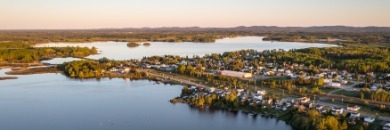Located in the heart of the boreal forest, Abitibi-Ouest boasts a wealth of farmland, lakes and rivers. In fact, 62% of our territory is farmland, and another 8% is covered by water bodies. Lakes Abitibi and Duparquet alone are dotted with nearly 1,000 islands and over 200 beaches. In fact, Île Moukmouk is right on our doorstep! For outdoor enthusiasts, nature is always nearby, whether you have both feet on the ground or in the water.
Although 47% of the territory is privately owned, Abitibi-Ouest has a natural heritage that is ideal for nature-based activities, as well as recreational and tourism infrastructure that make them easy to enjoy. Whether it's canoeing, kayaking, hiking, cross-country skiing, snowshoeing, cycling or motorized sports, over 2,000 km of trails and water courses are publicly accessible, often free of charge. And the land here is pristine. There is virtually no light, air or noise pollution, so you can admire the starry sky, smell the forest and listen to the sound of the wind in complete tranquillity.
The region's accessibility is also shaped by its recreational options. There are over 1,000 cottages and permanent residences dotted around some 20 bodies of water. It's a dream come true for anyone who wants to wake up every morning of their vacation with an unobstructed view of a lake as smooth as glass.
A rich and dynamic history
Abitibi-Ouest was forged by the tenacity of the pioneers who settled here, and their legacy can be seen today in the vitality of the predominantly rural communities. Tourism, historical and cultural sites bear witness to local and regional history. It's also important to note that the Abitibiwinni First Nation inhabited the territory of Abitibi-Ouest even before it was colonized by Euro-Canadians. Archaeological digs carried out at the national historic site of Apitipik, near lac Abitibi, revealed that the Abitibiwinni had occupied the land for more than 6,000 years. Although the Abitibiwinnik have now settled permanently in the community of Pikogan, it's important to remember the role they played in the region's history.


